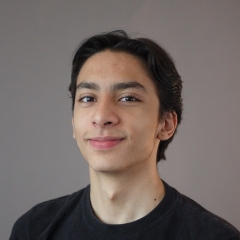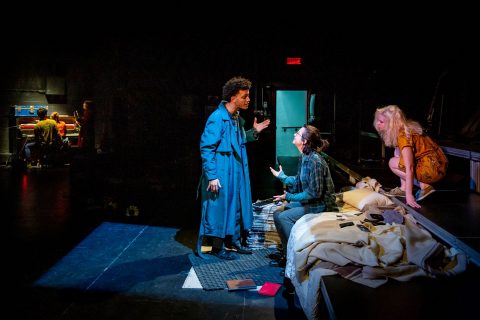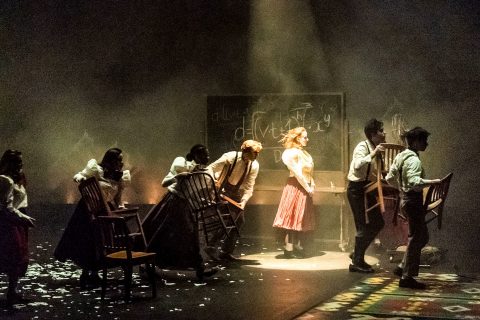Acting for the Theatre (BFA)
Student for a Day
Join us on campus! Spend the day rehearsing, creating, and collaborating inside our Theatre BFA program. You’ll join real classes, take part in hands-on workshops, and feel the energy of life in the theatre.
Register:
Why study Acting for the Theatre?
Train to become a versatile actor with a rich diversity of skills, ready to take on a wide range of roles and theatrical styles.
Begin by acquiring core acting skills such as text interpretation (scene and monologue work), movement, voice and presence, characterization, and ensemble work. At the same time, grow into a well-rounded theatre artist by studying dramaturgy/script analysis, collaborative methods, theatre history and theory, and scenographic design fundamentals.
As you move through the program, explore more advanced techniques and specialty skills, such as stage combat, theatrical Biomechanics, Viewpoints, singing, dialects, audition and camera, among others. Progress from acting styles rooted in psychological realism to range-expanding techniques based in psychophysical and non-realistic approaches. Apply your growing skillset by performing in productions of plays by great contemporary playwrights and iconic writers from the past. You’ll also have opportunities to create and perform original work.
Throughout your degree, gain exposure to the professional theatre scene in Montreal and beyond. You may do a supervised internship with an organization such as the Segal Centre, the Centaur Theatre, Geordie Theatre, and Bread and Puppet Theater. You may also have the chance to participate in an international exchange program or field schools; recent opportunities have included programs in Chinese opera in Beijing, and post-dramatic theatre in Germany.
By the end of the program, you’ll emerge with a clear sense of your own theatrical identity. You’ll know what kind of work you want to do and what kind of stories you’re inspired to tell, and you’ll have the confidence, abilities, and artistic daring to step into a professional career.
Program highlights
- Access state-of-the art studios, design classrooms, lighting lab, and a new costume shop
- Learn from working theatre professionals and become acquainted with Montreal’s theatre community
Special funding for out-of-province students
Up to $4000 for undergraduate programs.
Program structure
A Bachelor of Fine Arts degree takes a minimum of three or four years (90 – 120 credits) of full-time study, depending on your academic background.
Program option
- Specialization in Acting for the Theatre (60 credits)
Courses
Acting for the Theatre students begin by taking core theatre courses with all theatre students. As you progress and your skill base grows, you will take classes in specialty performance areas and advanced techniques.
You may also choose from courses that cover all practical aspects of theatre, including stage management, production, and dramaturgy.
United States students: A U.S. Federal Student Aid-eligible version of this program is offered. This version meets all U.S. regulations (such as no co-operative education or e-courses) for eligible programs.
Admission criteria
This program is available for Fall admission only.
Minimum cut-off averages and course requirements
- Quebec CEGEP: DEC
- High School: C+
- ACT or SAT is NOT required
- Canadian curricula course requirements
- Accepted international qualifications
- International Baccalaureate (IB) diploma: 26
- International Baccalaureate Career-related Programme (CP): 4.3/7
- Baccalauréat français: 11
- British system of education (GCE):
- A-levels: At least two A-level exams CD or
- AS-levels: At least 4 AS-level exams with equivalent results or
- BTEC: Level 3 Diploma or Extended Diploma in a related subject area with equivalent results
- Additional information for British System of Education (GCE) applicants
- University Transfers (internal/external): C
Additional requirements for admission
Applicants must submit additional requirements for admission directly to the department.
- Letter of intent
- Audition video
Following the review of your application, short-listed applicants may be asked to submit follow-up video assignments and/or be invited to a Zoom interview.
Check program availability as late applications will continue to be accepted for certain programs for an undetermined amount of time.
Minimum cut-off averages should be used as indicators. The cut-off data may change depending on the applicant pool. Applicants who meet the stated minimum requirements are not guaranteed admission to these programs.
Application deadlines

FALL ENTRY (September)
Deadline: March 1
U.S. and international applicants: Apply no later than February 1 to allow time for immigration document processing. However, applying earlier is strongly recommended. Immigration processing times vary by country, and delays could prevent you from starting your studies on time.

WINTER ENTRY (January)
Admission to this program is available for the Fall Term only.
We reserve the right to close admission to a program at any time after the official deadline without prior notice.
After your degree
As a Concordia Acting for the Theatre graduate, you’ll be joining an extensive, proud network of our alumni, many of whom have gone on to work with exciting theatre companies in Canada and around the world, and in film, television, and web series.
The program provides an excellent basis for advanced studies at the graduate level. Many of our students have been accepted (and, in several cases, received scholarships) into Master’s programs in acting at such notable institutions as New York University, University of Southern California, University of Washington, Naropa University, University of Iowa, Bristol Old Vic Theatre School, and the Central School of Speech and Drama in London, among others.
The program encourages the development of autonomous thinkers and theatre-makers, with the ability to create their own work, and many students go on to form their own theatre companies. Many of Montreal’s English language theatre companies are helmed by Concordia alumni. Our graduates possess an excellent foundation for any career – in theatre or beyond – in which presence, confidence, communication, and collaboration are integral. For example:
- Actor
- Producer
- Director
- Artistic director
- Performance coach
- Acting/voice/movement teacher
- Festival curator
- Casting director
- Narrator/voice-performer
- Clown
- Stunt or motion-capture performer
- Model
- Corporate product spokesperson
- Event animator (historical or fantasy character)
- Museum animator
- Event or broadcast host
- Workshop facilitator
- Public speaking coach
- Teacher
- Media relations specialist
- Politician
- Lawyer
Student story

Roman Castro Hernandez
Specialization in Acting for the Theatre
Minor in Film Studies
It’s a good opportunity to get a grasp of what it’s really like working in the real world on a production with a director, stage manager, designers and other actors.
Other programs of interest

A growing number of theatre professionals no longer see themselves solely as directors, playwrights or dramaturges, but rather as performance creators.
Department
Faculty

Develop your ability to work visually in a collaborative setting. Immerse yourself in the imaginative and analytical processes of communicating design ideas to create entire worlds on stage and in diverse of performance spaces. Discover and develop your own unique artistic voice as you explore the vast possibilities inherent in the world of scenographic innovation.
Department
Faculty

